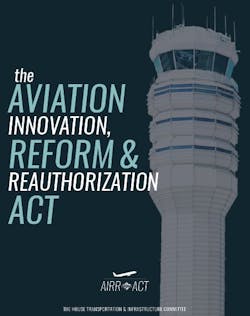Bill seeks to spin off air traffic control from Federal Government
The current authorization of the FAA and aviation programs expires at the end of March. This new legislation recognizes that maintaining the status quo will result in more setbacks and soaring costs of failed federal ATC modernization efforts, a bureaucracy that continues to stifle American innovation, and a system that is incapable of handling growing demand, officials explain. The AIRR Act seeks to move U.S. aviation into the modern era and beyond, they say.
Establishing an independent ATC provider has become the standard across the world, and the United States is one of the last industrialized nations yet to do so, officials add. Countries that have done so have consistently benefited from safety levels that have been maintained or improved, successful modernization of their ATC systems, improved ATC services, and generally lower ATC service costs, they say.
The federally chartered ATC corporation would be governed by a board representing the aviation system’s users and the public interest, according to the bill.
“The United States has led the world in aviation since pioneering this modern mode of transportation. We have the safest system in the world, and we will continue to do so under this bill. But our system is incredibly inefficient, and it will only get worse as passenger levels grow and as the FAA falls further behind in modernizing the system,” Shuster describes. “Furthermore, the FAA’s overly bureaucratic certification processes are handicapping American companies and causing us to fall behind our competition. The AIRR Act is transformational legislation that prepares the U.S. aviation system for the future, helps ensure a modern, safe system that benefits passengers and the economy, and keeps America competitive in a vital industry.”
“While the U.S. continues to have the safest aviation system in the world, it is clear we do not have the most efficient or effective system for future growth,” LoBiondo adds. “I commend Chairman Shuster for his willingness to engage and openness to ideas not only from members of the Committee, but from stakeholders across the industry to modernize and transform our aviation system to meet 21st century demands.”
The reauthorization bill also streamlines the FAA’s aviation equipment and aircraft certification processes, provides additional consumer protections, addresses aviation safety issues, gives the FAA more tools for the safe integration of unmanned aircraft systems, and provides for airport infrastructure improvements across the country, officials add.
Related news & information:
You might also like:
Subscribe today to receive all the latest aerospace technology and engineering news, delivered directly to your e-mail inbox twice a week (Tuesdays and Thursdays). Sign upfor your free subscription to the Intelligent Inbox e-newsletter at http://www.intelligent-aerospace.com/subscribe.html.
Connect with Intelligent Aerospace on social media: Twitter (@IntelligentAero), LinkedIn,Google+, and Instagram.


